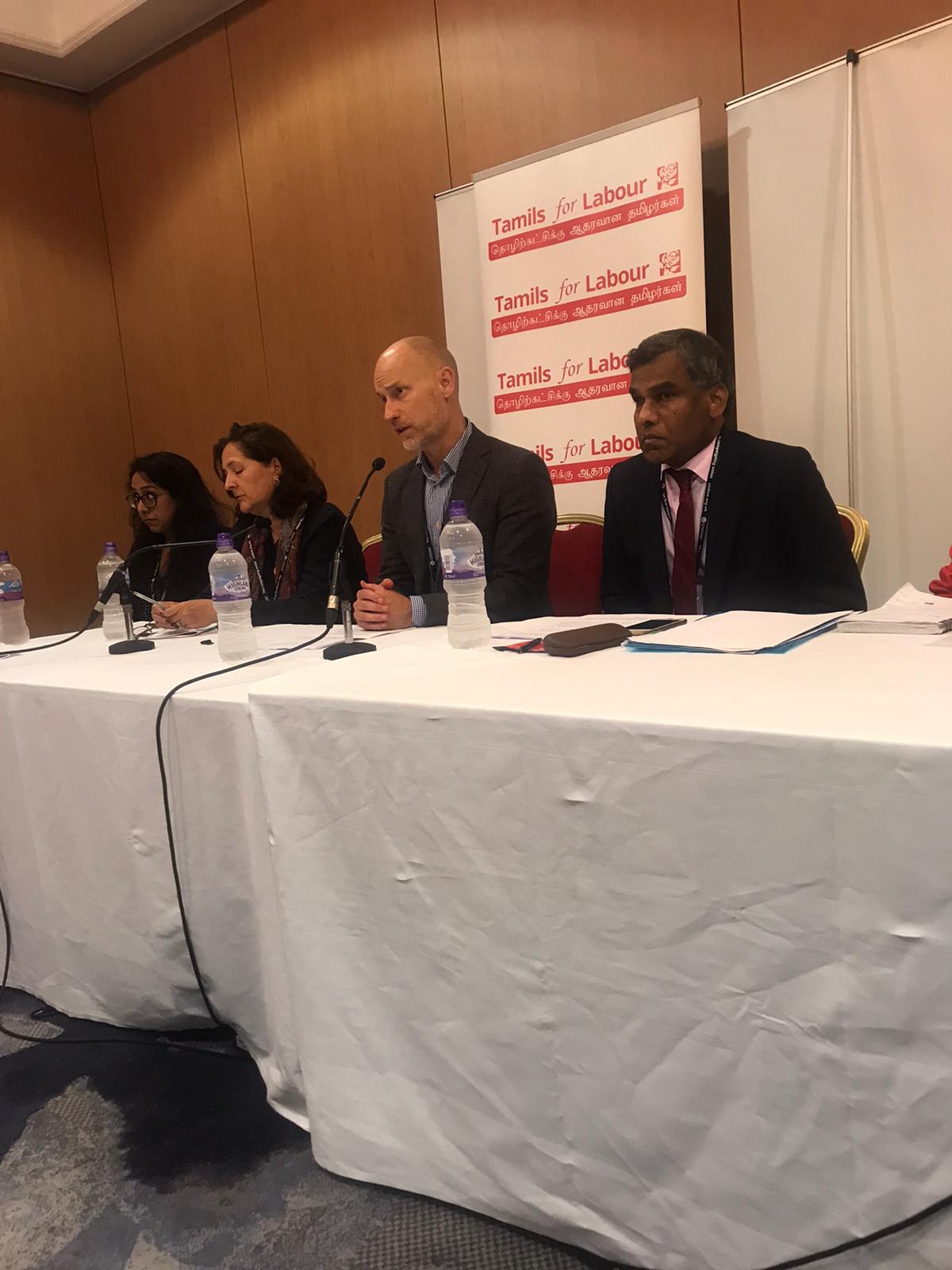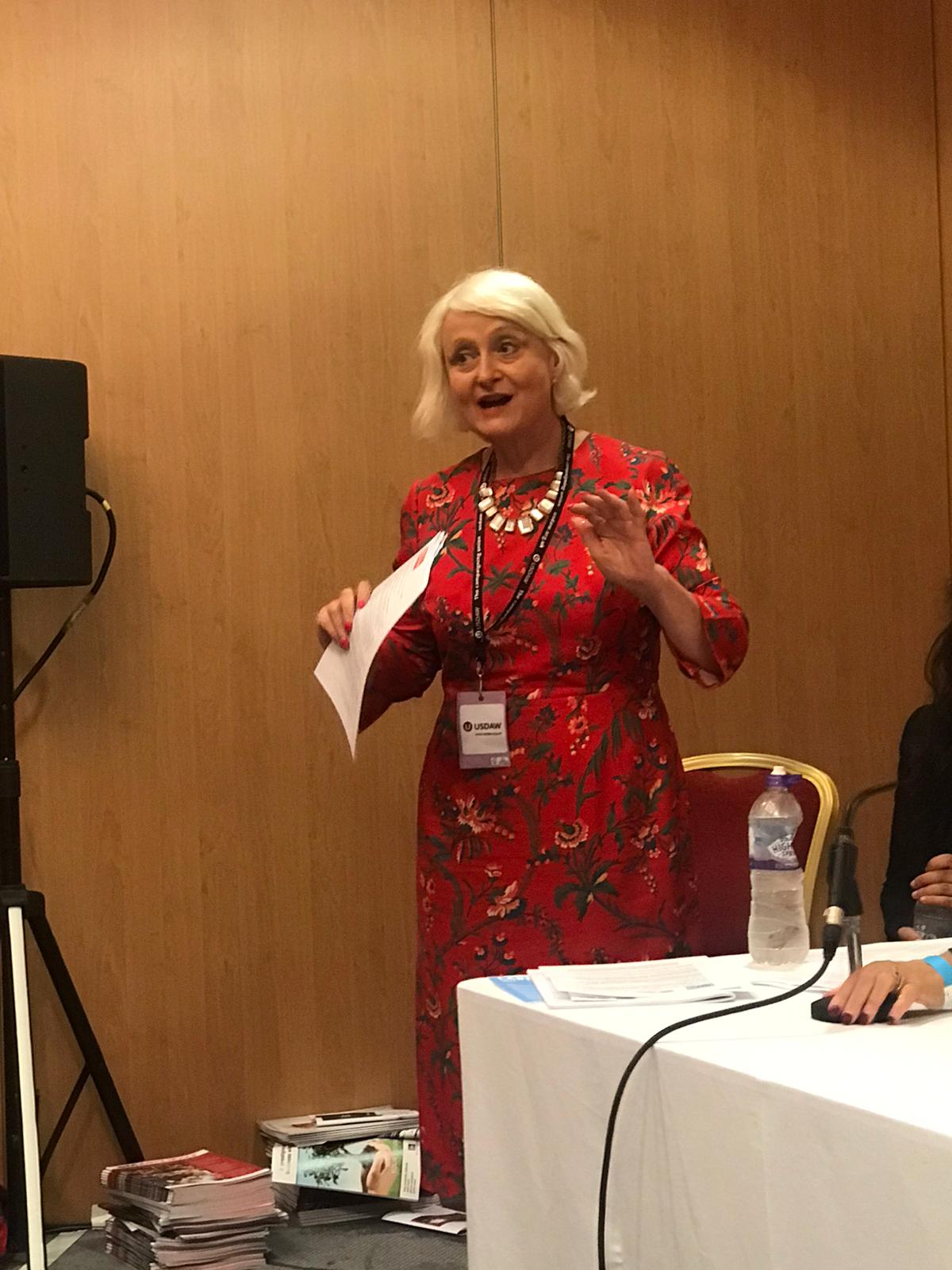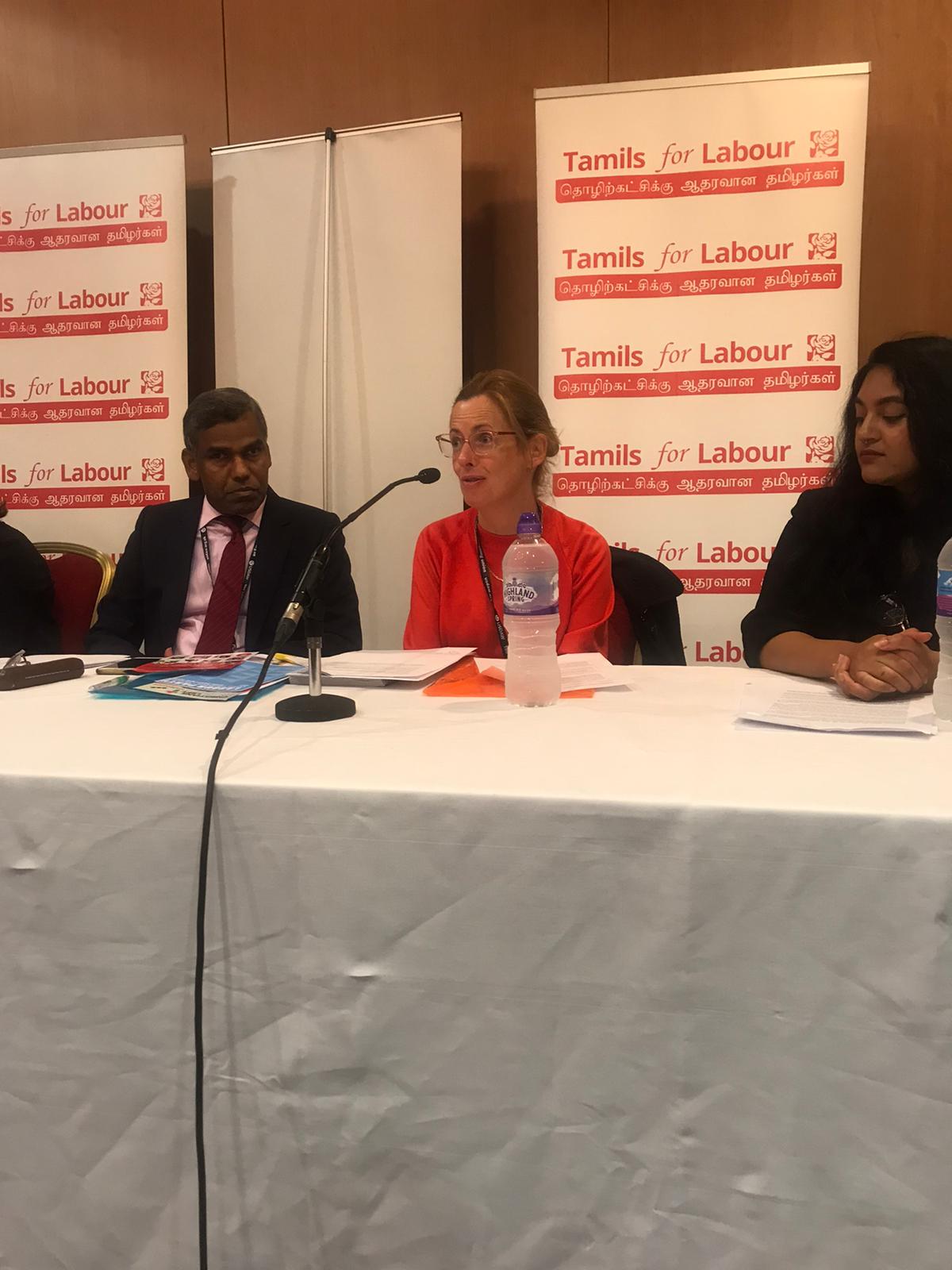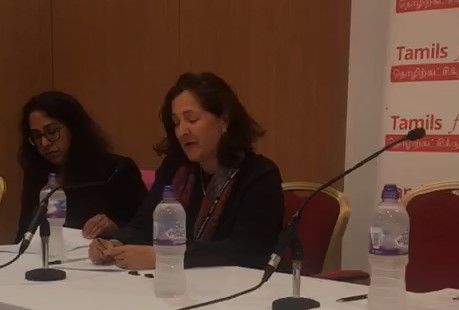Speaking at the event hosted by Tamils for Labour, during the British Labour Party's annual conference, Shadow Foreign Secretary, Lisa Nandy, maintained that the party has been pushing for "concrete steps" on Sri Lanka, such as a referral to the International Criminal Court.
"We pushed in March for the UN resolution to include concrete measures, such as an International Independent Investigative Mechanism (III-M) and for a referral of cases to the International Criminal Court (ICC)."
"These concerete steps are really important to us," she told the conference.
She further maintained that "human rights, the rule of law, freedom and democracy, will always be an essential component of Labour’s foreign policy". She also added that "if you threaten human rights anywhere you threaten human rights everywhere".
The conference was attended by a number of senior Labour party MPs including Shadow Minister for Asia, Stephen Kinnock, MP for Brent North, Barry Gardiner, Shadow Secretary of State for Women and Equalities, Dawn Butler, MP for East Ham, Stephen Timms, and MP for Mitcham and Morden, Siobhain McDonagh.
Panellists for the conference included former BBC correspondent and Program Coordinator for the International Truth and Justice Project, Frances Harrison; senior UK Advocacy Officer for People for Equality and Relief in Lanka (PEARL), Ahrabi Rajkumar; human rights advocate, Subashini Nathan; and, Chief Executive for Freedom from Torture, Sonya Sceats. The event was moderated by the Chair of Tamils for Labour, Sen Kandiah.
Shadow Minister for Asia, Stephen Kinnock

Speaking at the panel, Shadow Minister for Asia, Stephen Kinnock maintained the need for concrete action and whilst stating that the latest UNHRC resolution was a welcome step forwards, he also outlined its shortcomings.
"We feel that the UK government could and should have done more as the penholder", he stated.
He highlighted that the "resolution doesn’t make any commitment to universal or extrajudicial jurisdiction".
"Why not with if there are opportunities for some of the people who are accused of having committed genocide against the tamils, when they are outside of Sri Lankan territory. The resolution should give the basis for arresting and prosecuting them under different jurisdictions".
Kinnock noted the government's failure to push for an III-M and the need to properly resource the UN High Commissioner's office. He further noted that there was a clear "case for referring a number of senior members of the Sri Lankan military and government to the International Criminal Court".
Commenting on the British government's refusal to refer Sri Lanka to the ICC he stated:
"We don't understand why the British government hasn't done that. They say it's because they're worried about a veto from China and Russia, but should our foreign policy really be determined by whether or not China and Russia are going to wield the veto in the Security Council".
Kinnock also took issue with the timeline provided by the resolution noting that 18 months was too long and would just provide Sri Lanka more time to "obstruct and obfuscate" proceedings.
He further remarked that in the British High Commission in Colombo there is a Defence Advisor with links to senior commanders of the Sri Lankan military.
"Why do we have a military attache in Colombo who is apparently working behind closed doors with people who are very credibly accused of perpetrating human rights atrocities?" he asked.
Commenting on trade, Kinnock highlighted leaked remarks by Britain's previous foreign secretary Dominic Raab, who illustrated a willingness to work with human rights abusers, as well as the government's rejection of the genocide amendment to trade. Kinnock maintained that Labour would continue to scrutinise the government and to push for a trade policy that was ethical. Speaking at an earlier conference he asked:
"Why is the government not clearly stating it will not engage with GSP+ with Sri Lanka and that it will not do a trade deal with Sri Lanka as it is absolutely clear that there are serious human rights abuses and a serious lack of accountability, and its only getting worse with Rajapaksa".
MP for Mitcham and Morden, Siobhain McDonagh

In Siobhain Mcdonagh's address, she highlighted her lasting memories of the Tamil community gathered on parliament square in 2009 protesting the genocide at Mullaivaikkal.
"Nobody was listening. A hard working, entrepreneurial determined community had all of a sudden left their colleges and left their businesses, and left their work in complete despair that their family was being bombed by the government of their own country, and nobody was listening".
She recollected how the then foreign secretary, David Miliband, would invite Tamil students to meet with him at the Foreign Office and how he confronted Sri Lankan officials at the time. The experience, she notes, "left me determined that I would continue to do everything I could to help the Tamil community and not look the other way".
In her statement, she further noted,
"How could David Cameron, be able to go to Sri Lanka, and allow the Commonwealth conference to take place there, and to win plaudits for doing it? How can the Rajapaksas be back controlling the government of Sri Lanka. When there are all sorts of allegations of war crimes, of corruption, of nepotism?" she asked.
She maintained that she, along with her colleagues, would push to get back into government to achieve real change, "rather than standing on the sidelines".
MP for Brent North, Barry Gardiner
.jpg)
Speaking to the Tamil Guardian, MP for Brent North, Barry Gardiner, highlighted that for many the war is not over, as many still feel the trauma of being forced into seeking asylum outside of Sri Lanka.
"They need closure. They need to know that actually what happened to them and their loved ones is being properly recorded and acknowledged and punished. At the moment, there is no mechanism actively doing this."
He further highlighted that Sri Lanka continues to be an oppressive regime that targets Tamil youth, many of whom were too young to be engaged in the armed struggle.
Commenting on Britain's obligation's, he noted that the UK should not be "helping police who are often responsible for those human rights abuses, those crimes, those tortures".
"It's hard to see how you help torturers become better police," he noted.
He further spoke on the need for Magnitsky sanctions and lambasted the British government's anti-refugee bill.
Chief Executive for Freedom from Torture, Sonya Sceats

Sceats’ statement noted the rise of global authoritarianism and torture with Sri Lanka being “one of the worst examples”. Between 2009 and 2019 there were over 550 cases of torture, she stated, and "ongoing impunity for torture remains an enormous problem".
She further slammed the UK government "for sending mixed signals"; claiming to stand for universal values whilst elevating "trade interests over human rights concerns".
Sceats also criticised Police Scotland for its tranining of Sri Lankan officers, many of whom are responsible for horrific cases of torture which Freedom from Torture has been documenting.
In her speech she urged:
- For the UK to impose sanctions not only on Shavendra Silva but also key figures such as Defence Secretary, Kamal Gunaratne, who has been credibly accused of human rights violations.
- For the UK to bring police training of Sri Lankan officers to a complete halt.
- For the UK to withdraw its defence advisor stationed in Colombo.
- For the UK to review its preferential trade tarrifs for Sri Lanka on the basis of its commitment to good governance and human rights.
Commenting on the UK asylum, she notes that most of the Sri Lanka’s Freedom from Torture support are asylum seekers or refugees. She further highlighted the need to resist the anti-refugee bill, also known as the Nationality and Borders bill.
The bill she notes, would criminal asylum seekers, deny them protection, and eject them from the UK.
"This is the most incredible assualt on the principle of refugee protection that we have seen here since the end of the Second World War" she stated.
She encouraged attendees to sign the petition against the legisilation and for MPs to voice their opposition to the bill. The petition has over 52,000 signatures with 300 organisations mobilising against the legislation.
Programme Coordinator, Frances Harrison

In her remarks, Harrison highlighted that the UN resolution passed in March earlier this year, leaves 12 months for there to be another UN report on the situation in Sri Lanka. However, she also notes that funding for the mechanism established to collect data has been cut by 50%.
"It has only a year to gather evidence, to analysis it, and to send it to prosecutors, to send it to assumption bodies. That's an enormous task."
She expressed her concern that the resolution was simply becoming a "figleaf for inaction".
Commenting on the ITJP's campaign to sanction Shavendra Silva, Harrison noted the lack of response from the Foreign Office. She also slammed the continued funding for police training noting continued reports of "serious violations like torture and sexual violence".
Harrison further spoke on the plight of Tamil refugees noting that Eelam Tamil refugees have been arriving across the channel in rubber dinghies, "risking their lives to get here".
"Increasingly young Tamil men are coming here, who were far to young to be involved in the war, and who are being brutalised by the army, still in this year [...] When we're talking about accountability [...] it's not just about what happened in 2009, its what's continuing to happen now".
Speaking to the Labour MPs, Harrison urged them to take on the issues of police training; "the vetting and screening of diplomats" and UN peacekeepers; and imposing Magnitsky sanctions, not just on Shavendra Silva, but on a range of officials including Defence Secretary, Kamal Gunaratne.
Chair of Tamils for Labour, Sen Kandiah
During his speech, Chair of Tamils for Labour, Sen Kandiah, noted that the Labour party had worked shoulder to shoulder with the Tamil community to call out these injustices and urged the British government and UN institutions to hold Sri Lanka to account.
His statement drew attention to the ongoing protests by the families of the disappeared which have continued for over 1,660 days and noted the consensus amongst Tamils of the need for "an International Independent Investigation via the ICC or ICJ".
Kandiah further slammed the Conservative government for giving "Sri Lanka and other genocidal regimes a seat at the table" instead of imposing sanctions. Kandiah maintained that the government is more "concerned with economic and trading affairs rather than human lives".
UK Advocacy Officer for PEARL, Ahrabi Rajkumar
.jpeg)
Speaking at the conference, Rajkumar applauded the Labour party for its continued support for the Tamil community in “their efforts to secure justice for the atrocities committed against them as well as efforts for self-determination”. However, she notes, that there has been a “lack of tangible bilateral pressure from successive British governments on Sri Lanka” enabling a culture of impunity.
Sri Lanka’s continued failure to meet its international commitments undermines the credibility of the UNHCR, she added, stating “Sri Lanka must face tangible consequences for its brazen rejection of this process” she maintained, highlighting the islands fraught history of systemic discrimination against the Tamil nation since independence".
Rajkumar further detailed the Sri Lankan state’s crackdown on memorial events such as Maaveerar Naal in November and Mullivaikkal remembrance day in May. She notes that just a few days ago, “a Tamil MP was brutally manhandled and arrested" just for participating in a memorialisation event.
“It is vital that the right to remember is protected as this is integral for the healing of the Tamil community from the atrocities and violence that has been taking place over the past several decades and continue to occur now” she stated.
In concluding her statement, she noted PEARL’s request that Labour continues to work alongside British Tamils in “calling for accountability and justice for Sri Lanka’s war crimes”. She noted the need for MPs to review the “preferential trade scheme it currently has in place with Sri Lanka, as well as any other incoming trade scheme” and to ensure that they are contingent on a human rights monitoring mechanism. She also detailed the need for an “international judicial mechanism such as referral to the International Criminal Court or the International Court of Justice to persecute those who have been credibly accused of atrocity crimes including genocide”.
Her speech also noted the need for targeted sanctions and requested that Labour update the wording in its manifesto “to include wording on supporting efforts for an international accountability mechanism and a political solution on the island that supports the right to self-determination of all communities”.
